 Politics
Politics
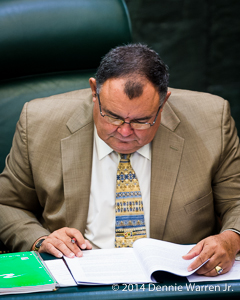
Independent members put pressure on officials
 (CNS): The PPM government has three weeks to go before its appropriations from the current 2013/14 financial year end but it is making slow progress towards the full passage of its new budget. Finance Committee chair Marco Archer has cut out the long lunches and has members following his stringent time keeping but his efforts are up against some intense scrutiny coming from the opposition benches. The independent members for East End and North Side, in particular, are pressing officials for details on almost every line of the budget, ensuring spending plans for the more than half a billion dollars of public money are aired and the cash justified. (Photo Dennie Warren Jr)
(CNS): The PPM government has three weeks to go before its appropriations from the current 2013/14 financial year end but it is making slow progress towards the full passage of its new budget. Finance Committee chair Marco Archer has cut out the long lunches and has members following his stringent time keeping but his efforts are up against some intense scrutiny coming from the opposition benches. The independent members for East End and North Side, in particular, are pressing officials for details on almost every line of the budget, ensuring spending plans for the more than half a billion dollars of public money are aired and the cash justified. (Photo Dennie Warren Jr)
Finance Committee began on Thursday of last week, but so far appropriations for just one of government’s nine ministries and portfolios have been completed and a second one close to the end.
MLAs spent two days scrutinizing the premier’s Home and Community Affairs Ministry last week before work began on the planning minister’s appropriations on Monday. Despite working for some ten hours, the committee did not complete Kurt Tibbetts’ ministry and will still need to deal with his equity investments and transfer payments when the committee reconvenes Wednesday after the break Tuesday for Cabinet.
Opposition Leader McKeeva Bush and his West Bay CDP (former UDP) colleagues, as well as Independent MLAs Arden McLean and Ezzard Miller and even some of the government’s own back-benchers have been probing officials about what the appropriations are for and the success of government programmes and asking ministers about the policies in the various departments that fall under their responsibility.
Miller told CNS there were two main reasons why it was important that members of the Legislative Assembly quiz the ministers and their civil servants over the allocation of public cash.
“It is the one and only time per year that we, as representatives, get an opportunity to ask questions about the government’s programmes and what they are supposed to be doing,” Miller said.
He explained that although government may be trying to rush the process because they left it so late to bring the budget, members had a duty to continue the scrutiny.
“The public has a right to know these details and unless you are familiar or know your way around the more than 250-page documents it is hard to determine what the appropriations represent,” he said, as he confirmed that he along with other members would continue the detailed questioning of government.
The UDP government changed the Public Management and Finance Law in 2010 to remove the April deadline for the delivery of the budget to the parliament, facilitating some 11th hour budgets and cutting back on the time left for Finance Committee to question government’s spending plans.
Several times during the previous administration the committee sat into the small hours of the morning in the wake of the budget delivery. This led to many members missing the opportunity to grill those who are responsible for spending tax-payers money as they refuse to sit at two and three in the morning. Since taking up the post of finance minister, however, Archer is running the committee more efficiently but by doing so he has provided members with a more convenient opportunity than his predecessor did to probe civil servants and the Cabinet members.
The Finance Committee is expected to reconvene on Wednesday at 10am in the Legislative Assembly with the last few appropriations for the planning and agriculture ministry. Following that Osbourne Bodden, the minister of health and the man responsible for the dump, along with his staff will be taking the hot seat.
The proceedings are being aired live on the government TV channel CIGTV and being rebroadcast in the evenings on Radio Cayman.

CIG runs up $8.6M travel bill
 (CNS): Between 2009 and 2012 the UDP government ran up a bill of at least $8,576,554 on travel and hospitality expenses, a new report from the Auditor General has revealed, but because of poor record keeping the true figure is unknown and could have exceeded $10million. Alastair Swarbrick, said he couldn't be exact because of the very poor management as well as what appears to be a laissez faire attitude to the public purse when it came to travelling by both ministers and civil servants. Despite the constraints on government coffers at the time, Swarbrick and his team found travel expense increased during these three years by some 10% and well over half of the cash spent on travel was run-up by the Finance and Tourism ministry.
(CNS): Between 2009 and 2012 the UDP government ran up a bill of at least $8,576,554 on travel and hospitality expenses, a new report from the Auditor General has revealed, but because of poor record keeping the true figure is unknown and could have exceeded $10million. Alastair Swarbrick, said he couldn't be exact because of the very poor management as well as what appears to be a laissez faire attitude to the public purse when it came to travelling by both ministers and civil servants. Despite the constraints on government coffers at the time, Swarbrick and his team found travel expense increased during these three years by some 10% and well over half of the cash spent on travel was run-up by the Finance and Tourism ministry.
The report, which concentrated on core government, reveals it spent over $7 million on travel and a further $1.5 million on hospitality. The two ministries running up the biggest bills were the Ministry of Finance, Tourism and Development (MFTD), led at the time by former premier and current opposition leader, McKeeva Bush, and the Ministry of District Administration, Works, Land and Agriculture (DAWLA), which was led by Juliana O’Connor-Connolly, who is now speaker of the House. These two ministries represented 70% of all travel and hospitality expenditures incurred over the audit period.
Although government has now implemented a formal travel policy which addresses some of the incidents reported by Swarbrick, the government auditor said much more needs to be done as he found such serious shortcomings and problems implying abuse by both civil servants and politicians.
Individuals received expenses twice, per diem rates varied widely for the same trips, documentation for expenses was missing but requests were still paid, advances were never justified with receipts or any other evidence and written off, ministers were signing off on their own expenses and in many cases there was no formal justification for the trips made, the OAG found.
In the first three years of the United Democratic Party administration civil servants were extremely lax regarding travel expenses and the documentation to support these costs was completely lacking, the report reveals.
“I have concluded that official travel and hospitality expenditures were not managed effectively and efficiently, leading to the high likelihood that the Government mishandled significant amounts of public resources,” Swarbrick said.
Speaking at a press conference on Monday morning, the auditor general said that “no one was managing the shop” and raised his concerns that after four years the issues he raises keep being repeated and that nothing gets done.
“I found that there was an absence of well-defined policies and ineffective or absent procedures and controls. Any policies that were in place were inconsistent across government and officials were left with significant, if not complete, discretion with regards to how travel and hospitality expenditures were incurred. Monitoring and reporting of these transactions by management was virtually non-existent,” he added.
Swarbrick explained that the poor management of the records prevented his team from completing as thorough an audit as he planned, limiting its scope and preventing him from arriving at any exact figures. He said the lack of documentation to support expenses hindered the team’s ability to provide more or detailed information on how the expenses were managed or quantify or how much was mishandled or wasted.
Swarbrick listed a catalogue of shocking disregard to public money, from lavish Christmas parties and presents for people, buying booze for various hospitality events, including dinners, and social functions without any clear link made to business objectives and consideration given to value for money. Although personnel regulations in the public sector state that liquor cannot be reimbursed as travel-related expenses, in one example Swarbrick said the DAWLA spent $29,480 on three Christmas parties, which included a booze bill of $6,373, while at the MFTD, five entertainment events, including three Christmas parties, a special function, and a birthday party, also clocked up around $6,000 at the bar.
The government auditor also pointed to his concern that in some case ministers had approved their own travel claims for payment or did not provide support for their expenses but the chief financial officers paid the expense claims regardless. He said one ministry wrote off $167,000 for travel advances issued between 2003 and 2009 to a senior officials but he said there was little evidence of significant collection efforts being made.
During the three year period of the audit there were significant financial problems with government coffers and public debt Swarbrick noted. While government was trying to cut spending, including reducing the number of jobs and cutting salaries of public servants, travel costs were increasing.
“During the same period, we noted that travel and hospitality showed an upward trend of 10% over time,” he said as he raised concerns about the serious disregard for the use of public funds, adding that there was a high likelihood government mishandled significant amounts of public resources.
The auditor general noted that government has taken an important first step in acknowledging the serious shortcomings in the management of these expenditures by introducing a travel policy. But, he said, it still needs to develop the necessary practices and procedures to manage public funds and make sure they are not misused by public officials.
Swarbrick makes some eleven recommendations but many are similar to ones he has made in other reports over the last four years and by his predecessor for some ten years before that.
See the full report below and check back to CNS tomorrow for a more detailed look at some of the questionable issues surrounding the audit’s findings.

Premier alleges abuse of office by former colleague
 (CNS): Premier Alden McLaughlin took his former political party colleague Arden McLean to task last week as tensions between the two men continue to increase. Winding up the budget debate on Wednesday evening, McLaughlin accused McLean of abusing his position by using his contribution to the debate to angrily attacked government regarding his nephew, who had been refused a job with the RCIPS as a trainee helicopter pilot. McLaughlin said the independent member for East End had done the House a disservice when he had “chosen to air his family’s laundry” on the floor of the Legislative Assembly.
(CNS): Premier Alden McLaughlin took his former political party colleague Arden McLean to task last week as tensions between the two men continue to increase. Winding up the budget debate on Wednesday evening, McLaughlin accused McLean of abusing his position by using his contribution to the debate to angrily attacked government regarding his nephew, who had been refused a job with the RCIPS as a trainee helicopter pilot. McLaughlin said the independent member for East End had done the House a disservice when he had “chosen to air his family’s laundry” on the floor of the Legislative Assembly.
“I have never heard anyone use their position as an elected member of this House to seek to further a member of his own family. It is an abuse of office,” the premier said, adding that had the Standards in Public Life Bill been in effect, McLean would have fallen foul of that law.
During his contribution last week, McLean had become exceptionally emotional and angry when he related the story of his nephew, who had dreamed of becoming a helicopter pilot ever since he was a young boy, and having gone overseas to study and train, he had applied to the RCIPS to join the air support unit.
However, McLean said he was disregarded as he was told he did not qualify and was given a list of companies to apply to from the ministry. McLean said it was an appalling state of an affairs when a young Caymanian had studied long and hard to follow that dream and qualify in his chosen profession to be turned away by his own country. McLean said that in the end his family member had gone to Jamaica, where the Defence Force there was helping the young pilot with further training and more flying hours.
Talking about the wider problem of young Caymanians being marginalized, McLean spoke of and the need for government to address the issue of those returning from college and training overseas not being able to find opportunities and the vicious circle of employers wanting them to have experience when no employer was prepared to give them a chance to gain experience.
McLean said he hoped his family was not being discriminated against but when he began trying to secure work at home he was rejected. McLean described what happened to his nephew as an abomination. Aware that he is not yet a qualified pilot, Mclean said he could not believe that the RCIPS could not offer him an entry level job where he helped on maintaining the chopper and support work and flew with the pilots to increase his flying time.
The East End member said the budget meant nothing if “our own people are not a part of it”, pointed to the mounting disillusionment of young Caymanians and the pressing need to remove the stumbling blocks placed in front of them.
As he wrapped up the debate, McLaughlin said he had to address the member’s allegations as he said that his nephew was assisted to look at numerous other possibilities, from training with the military in the UK or helping him find a commercial placement. The premier said the vacancy for the helicopter pilot with the RCIPS was for a fully qualified helicopter pilot and McLean’s nephew did not yet have anything close to the flying time required.
McLaughlin read from a lengthy memo which outlined all that the ministry of home affairs had done to try and assist McLean’s young nephew to find a place where he could increase his flying time and work towards joining the air support unit with the RCIPS.
He said that the ministry was also trying to find funding to help Darren McLean increase his flying hours or find training. The premier also said he had been invited by the Unit to join come along and fly as an observer but the RCIPS cannot take him on until his flying hours have increased.
The premier was also clearly angry that McLean had made such a public issue alleging that nothing had been done to help the young McLean in his dream. McLaughlin said the member knew full well that he was not involved in any kind of conspiracy to keep his nephew from his lifelong dream of becoming a helicopter pilot.
“Nothing could be further from truth and he knows in his heart of hearts that it would never cross my mind. He knows my advocacy for young people in this country; he was part of same party and administration as me for years … What he did … was wrong by any measure,” the premier said, adding that government was continuing to assist and he needed to set the record straight as the country was not being told the truth about what had happened.
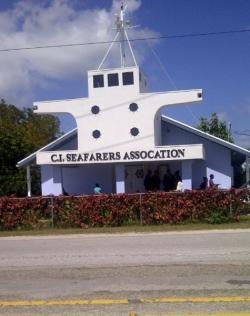
Seamen benefit reform coming
 (CNS): The premier has signalled that the Progressives will be examining the criteria and circumstances under which benefits are given to veterans and ex-servicemen. The issue was raised when Finance Committee examined the Community Affairs Ministry Friday and voted on several line items that amount to many millions of dollars given in welfare, poor relief and benefit payments to various different groups. Government is expecting to help around 1,000 families during the course of this budget year temporarily with food vouchers, rent, school, lunches and other welfare support but a significant sum is paid to seamen and veterans or their widows, none of which is means tested. Over 70 seamen are waiting to get on the list, which has some 800 recipients already on it.
(CNS): The premier has signalled that the Progressives will be examining the criteria and circumstances under which benefits are given to veterans and ex-servicemen. The issue was raised when Finance Committee examined the Community Affairs Ministry Friday and voted on several line items that amount to many millions of dollars given in welfare, poor relief and benefit payments to various different groups. Government is expecting to help around 1,000 families during the course of this budget year temporarily with food vouchers, rent, school, lunches and other welfare support but a significant sum is paid to seamen and veterans or their widows, none of which is means tested. Over 70 seamen are waiting to get on the list, which has some 800 recipients already on it.
Government is spending over $6.2 million in direct benefit payments to Caymanians or their surviving widows who served at sea, fought in either of the world wars or served in the Trinidad Navy. The payment of around $500 is paid to those who qualify, regardless of their income, and some elderly seamen and veterans are poor and in need but there are now concerns that some of those receiving benefits are not. However, there are 700 ex-seamen still waiting to get on the list but cannot because government does not have the resources to add new beneficiaries.
The extent of support that government pays to people in need was revealed during the scrutiny of both the output groups to manage the diverse range of welfare, benefits and support that government gives to the elderly, families in need and other indigents and the transfer payments.
There were questions regarding the number of veterans and seaman Cayman still has receiving benefits, which by its very nature was expected to decline over the years, but because many of the men who fought in the war or served at sea have younger widows the numbers have not begun to decline as anticipated.
Arden McLean said the policy of paying any man who had been to sea regardless of his financial circumstances was a badly thought out policy and had been introduced to help politicians in the late 1990s win an election.
However, Premier Alden McLaughlin, who is also the home and community affairs minister, said that his government would be examining the criteria and the circumstances surrounding these benefits and that the subject was expected to be discussed by caucus as the cost was escalating.
McLaughlin said Cabinet was already considering some recommendations and over the next few months some decisions would be made about the climbing costs and growing waiting list. He said people only come off the seamen of veterans list if they move overseas or die. Even then, much younger widows are still entitled to the benefit payment. As of 31 May, he said, more than 800 were getting payments while 793 people were on the waiting list. He pointed out that as more ex-seamen reach 60, that list grows and the government did not have the means to increase the budget for benefits.
Captain Eugene Ebanks said it was unfair when those in need, some of whom had been on the list for several years, were not getting anything when others who are not so badly off were.
With the Community Affairs Ministry also dealing with an increase in the need for permanent recipients of benefits, such as the elderly, disabled and indigent Caymanians, as well as families seeking temporary poor relief, the amount of welfares government has to hand out is increasing.
While some MLAs were clearly concerned about the amount of welfare being paid out of a cash-strapped public purse, others pointed out that it was an illustration of how bad things had become for many people.
Arden McLean, the independent member for East End, said it was a clear signal that “a lot of people are hurting and coming to government for assistance”, a sentiment shared by veteran politician and PPM backbencher Anthony Eden.
“I have never seen so many people hurting in my entire life. During my political career it has never been this bad. It’s rough, rough out there,” Eden said, as he warned that something had to happen to prevent people from turning to violence.
The rising levels of the support needed in the community also led to a number of questions about how Cayman was dealing with its aging population.
The premier signalled that he was examining the re-introduction of liens on the homes and assets of the elderly who were in long term residential care or were on government benefits. McLaughlin said that too many families were expecting to inherit property from the elderly parents and were blocking the sale of land of homes to pay for their care. McLaughlin said many, older Caymanians have such assets but they do not have cash so government was picking up the tab.
He said one of the challenges, because of the advance in the social services system and health care, was a common belief of children that their parents' property shouldn’t be signed over to government. McLaughlin said the last government had abandoned the lien process but the amount of money government advances to people who have assets was growing. He explained that when they then pass on, the children inherit the property but the government is left out of pocket.
He said there were concerns about the elderly whose families were not taking care of them when they can’t take care of themselves and can’t afford to stay at the Pines, which although partially supported by government, is a private rest home. He said government had to find a way to help the elderly live in dignity.
Community Affairs Chief Officer Dorine Whittaker said that this financial year was the year that the ministry would be examining the elderly and their circumstance more closely. Government, she told the committee, has gradually been collecting data and information about the circumstances of Cayman’s elderly population and consulting with them about how they are living.
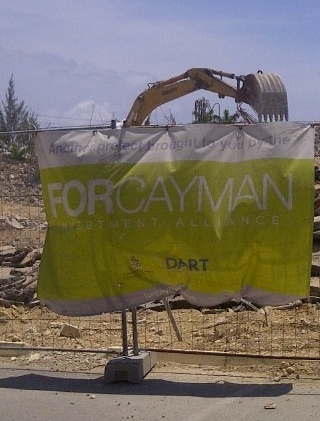
Dart talks move forward
 (CNS): Following recent comments that no progress had been made between government and the Dart Group over the agreements the developer had made with the previous administration, the premier said Wednesday that a recent meeting between him and the Dart CEO had led to a better understanding on both sides. Alden McLaughlin gave no details of the advances made between the parties but said that he had received a letter from Dart, which he described as “very helpful”. He said he was optimistic that over the course of the next few weeks the government and the islands’ largest investor would be able to come to terms on which they could agree, but the premier was reluctant to say more as he said the understanding was still at risk.
(CNS): Following recent comments that no progress had been made between government and the Dart Group over the agreements the developer had made with the previous administration, the premier said Wednesday that a recent meeting between him and the Dart CEO had led to a better understanding on both sides. Alden McLaughlin gave no details of the advances made between the parties but said that he had received a letter from Dart, which he described as “very helpful”. He said he was optimistic that over the course of the next few weeks the government and the islands’ largest investor would be able to come to terms on which they could agree, but the premier was reluctant to say more as he said the understanding was still at risk.
Speaking in the Legislative Assembly as he wrapped up the budget debate yesterday, McLaughlin said that since taking office, the PPM government had met with Dart around nine times with little progress being made on the outstanding negotiations in relation to the development of the Kimpton Hotel, the closure of the West Bay Road and the redevelopment of the Seven Mile Public Beach area. McLaughlin said that his team wanted to negotiate terms that would be more acceptable to the people of the Cayman Islands.
He said people were aware of the stumbling blocks and government had been careful about what it had said regarding the talks, as government believes the Dart Group is a major and important player in the Cayman economy, having invested millions of dollars. The premier told his parliamentary colleagues that there was every indication that the group wanted to invest more and, as a result, the government wanted to do all it could to partner with Dart to create opportunities.
At the recent meeting with the CEO of the Dart group, McLaughlin said, significant progress had been made and resulted in a better understanding and appreciation of what both sides require. McLaughlin told the LA that he had received a letter on Tuesday that had given him cause to be optimistic.
The premier added that it was important that things were not left hanging with respect to the previous agreements and said he wanted to encourage Dart to continue investment in the local economy.
Stating that he could not go into detail as it may all still fall apart again, he felt there had been more positive progress, and given his most recent statement that there was none, he wanted to indicate things had moved forward.
During the run up to the May 2013 election the PPM had campaigned on the basis that it wanted to renegotiate the terms of the agreements that had been made between the UDP government and Dart in connection with the deals known as the NRA agreement and the wider ForCayman Investment Alliance.
While in opposition the PPM had wanted to retain some form of access along the West Bay Road but following the election the new government said there was nothing it could do regarding the closure of the road but it was focusing on renegotiating the 50% accommodation tax concession, which Planning Minister Kurt Tibbetts had described as unacceptable.
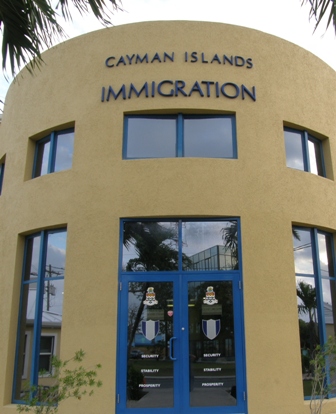
Immigration: Carrot not stick
 (CNS): Premier Alden McLaughlin has signalled a move towards incentivizing employers to train and employ local people rather than forcing them, as he said governments have tried that for decades and it hasn’t worked. Although the premier has spoken about improving enforcement when it comes to checking that employers are not abusing the system, he has now signalled a new approach that will encourage rather than compel bosses to take on Caymanians. Speaking in the Legislative Assembly on Wednesday evening as he wrapped up the Throne Speech, Policy Statement and Budget Address, he said government was working on a new accreditation system that he believed would have more success in seeing Caymanians replace permit holders.
(CNS): Premier Alden McLaughlin has signalled a move towards incentivizing employers to train and employ local people rather than forcing them, as he said governments have tried that for decades and it hasn’t worked. Although the premier has spoken about improving enforcement when it comes to checking that employers are not abusing the system, he has now signalled a new approach that will encourage rather than compel bosses to take on Caymanians. Speaking in the Legislative Assembly on Wednesday evening as he wrapped up the Throne Speech, Policy Statement and Budget Address, he said government was working on a new accreditation system that he believed would have more success in seeing Caymanians replace permit holders.
The premier said he recognised that Cayman cannot be insular and restrictive in regard to immigration. He warned that there is a “tendency in tough times to want to force companies to employ locals and not allow any more permits”, but McLaughlin said he has spent a lot of time thinking about and observing the issues surrounding immigration and had concluded that it is not possible to compel companies to hire people that they don’t want to hire.
Given the amount of resources that would be required to enforce such a regime, he said it would be impossible to make it work. He said successive governments have tried to drive employers to employ and train local people instead of recruiting overseas by enforcement but it has not worked. McLaughlin said he believed government needs to incentivize bosses to train and hire as we have not succeeded in achieving more opportunities for locals by force for over 40 years.
“In my view it is never going to work,” he said as he pointed to the new initiative he hoped to get underway this year. He said he wanted to breathe new life into an accreditation scheme which had been worked on during the 2005-2009 PPM administration.
Although he did not spell out the details of the proposals, the premier said a lot of work had been done on this in the past. He said his ministry was now looking at how it can implement an accreditation scheme that would reward employers who have high levels of local employees in the forthcoming amendments, as an incentive rather than continuing down the road of compulsion.
Following the first phase of immigration changes, the premier had signalled an intention to police the workplacemore closely and ensure bosses were complying with the immigration law and that what they said on business staffing plans and other submissions to government regarding their employees and training of local workers was accurate. He had announced financial provision for more front line immigration enforcement officers who would make workplace inspections. McLaughlin did not say if those plans had been abandoned, given the shift to a carrot rather than a stick approach in efforts to persuade employers to taken on train, develop and promote local workers.
McLaughlin stated that phase two of the changes to the immigration law will focus on the work-permit system and the way that the application process is administered. The premier also raised the issue of finger-printing as an extra aide to border security and said consideration was being given to begin creating a data base, starting with permit holders.

Budget passes through House in absence of opposition
(CNS): Premier Alden McLaughlin concluded his closing remarks on the budget speech around 6:30 on Wednesday evening but there were no members of the opposition benches in the House when the budget was put to the vote. Although the leader of the opposition, Mckeeva Bush, had notified the House of his absence due to a medical appointment overseas, the rest of the opposition benches left the parliament before the proceedings had been concluded. Most government members were there to offer support for the budget, though Deputy Premier Moses Kirkconnell had also sent word that he was unable to attend the meeting.
The budget passed with eleven ‘ayes’ from the government benches and recorded six absentee members. The meeting was then adjourned until the Finance Committee proceedings, which are expected to begin at 10am Thursday.
All members of the LA except for the opposition member for West Bay, Captain Eugene Ebanks, made a contribution to the debate, with minsters using their two hours to update on their areas of responsibility. Other members offered a mix of support for the budget as well as raising their own questions or concerns.
The MLAs will now examine the line items of the appropriations bill ministry by ministry to see what government will be spending its more than half billion of operating expenses on and why.
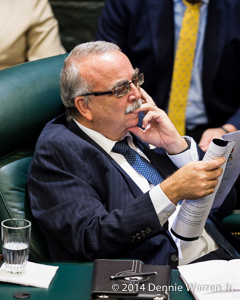
McTaggart admits mistakes in ‘whistleblowing fiasco’
 (CNS): George Town MLA Roy McTaggart has admitted that he made mistakes and had received a “political flogging” over what he described as the "whistleblowing fiasco" in connection with a report by the Office of the Complaints Commissioner (OCC). McTaggart was referring to a motion rejected by government during a Legislative Assembly meeting in Cayman Brac the last time parliamentarians met. He said he had proposed a motion in the OCC oversight committee requesting that the chair, Ezzard Miller, draft a motion for the LA but he misunderstood how that motion would have developed. Despite sitting on the government benches, the C4C member also said he didn’t know at the time that government was already working on legislation to protect whistleblowers.
(CNS): George Town MLA Roy McTaggart has admitted that he made mistakes and had received a “political flogging” over what he described as the "whistleblowing fiasco" in connection with a report by the Office of the Complaints Commissioner (OCC). McTaggart was referring to a motion rejected by government during a Legislative Assembly meeting in Cayman Brac the last time parliamentarians met. He said he had proposed a motion in the OCC oversight committee requesting that the chair, Ezzard Miller, draft a motion for the LA but he misunderstood how that motion would have developed. Despite sitting on the government benches, the C4C member also said he didn’t know at the time that government was already working on legislation to protect whistleblowers.
Speaking during the budget debate in the LA on Monday, McTaggart claimed the impetus for the motion, which he had proposed, didn’t emanated from him but was at the direction of the committee's chair. McTaggart admitted that the minutes reflected that the members of the committee had invited Miller to draft a motion and he had proposed it but he said that he did not expect the North Side member to table the motion the way he had.
The government had rejected the motion that was brought by Miller to the LA asking government to adopt recommendations made by the complaints commissioner on how best to encourage and protect whistleblowers in public office. Despite showing his support for the motion in the committee meeting, once in the LA McTaggart voted ‘no’.
Speaking about the events and the subsequent revelaitons of the minutes on CNS, McTaggart said he was trying to be as truthful as possible but he was not aware that Miller had planned to move the motion when he laid the report as the C4C member said he had expected to see some notification and discussion about the proposed motion.
Claiming that he was unaware at the time that the government of which he is a member was in the “advanced stages of drawing up whistleblowing legislation” when the motion appeared before the House, McTaggart said it no longer made sense, which is why he voted against it though his individual vote would have made no difference to the outcome.
However, acknowledging that things had gone awry, McTaggart said, “I have learned from the experience and will do things different next time around,” adding that it was never his intention to lie.
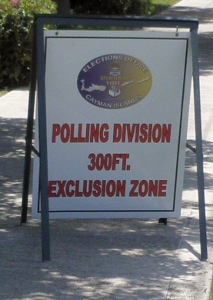
OMOV missing from agenda
 (CNS): Two government members and the independent member for North Side have all raised the issue that the elections law is missing from government’s legislative agenda. While the next election is still three years away, in his contribution to the budget debate Thursday Ezzard Miller raised concerns that, with no plans to address it this year, Cayman could still go to the polls in 2017 under the old system. On Friday PPM member Al Suckoo said he would be doing everything he could to lobby for the change and then on Monday Roy McTaggart, the C4C member for George Town, also suggested implementing a newvoting system sooner rather than later.
(CNS): Two government members and the independent member for North Side have all raised the issue that the elections law is missing from government’s legislative agenda. While the next election is still three years away, in his contribution to the budget debate Thursday Ezzard Miller raised concerns that, with no plans to address it this year, Cayman could still go to the polls in 2017 under the old system. On Friday PPM member Al Suckoo said he would be doing everything he could to lobby for the change and then on Monday Roy McTaggart, the C4C member for George Town, also suggested implementing a newvoting system sooner rather than later.
With no plans to bring the legislative changes this year, Miller was the first to raise concerns that this was a clear signal that the PPM-led government would not usher in the changes, despite the widespread support across the country, in time for the 2017 national vote. He said that if government is waiting until the 2015/16 year to address it by the time any legislation is ready the government will run out of time to implement the changes.
Despite having campaigned on a platform to introduce 'one man, one vote', the PPM leader and premier made a dramatic U-turn on the issue during a the debate on a private members motion brought by the member for East End, Arden McLean, earlier this year. Alden McLaughlin said that he did not have the full support of his entire government and he would not push through voting reform without consensus.
However, back-bench government member and Bodden Town representative Al Suckoo vowed Friday during his contribution to the budget debate to lobby hard for the introduction of OMOV in single member constituencies, as he said he still believed it was the best option. Suckoo told his colleagues that a lot had been said on the subject and while he recognized there were some different views in government and he would wait for the internal debate to finish, he promised to work hard for the reform during this administration.
Roy McTaggart also raised the issue in his contribution on Monday. He was elected in George Town, where voters had six votes in the 2013 election as a result of the growth in the electors register, which had fuelled the concerns about voter inequity. The C4C member of the government said that he too had noted that the elections law was absent from the agenda. McTaggart said if the government was to achieve a change then the law must be handled in the coming year. The second elected member for George Town said he wanted to see the debate start on how the system could be changed and warned that supporters and the voting public are expecting to see some movement on this subject.
McLaughlin has never said how many of his government members do not support the change in the voting system or which of those members are not backing the move to what most people agree is a more equitable voting system. In the face of the rejection of his private members motion in February, Arden McLean pointed the finger at McLaughlin as being the real stumbling block to OMOV and one of the reasons he resigned from the PPM.
In July 2012 the referendum returned a majority in favour of 'one man, one vote' in single member constituencies, which was still rejected by the UDP government at the time as it was not a majority of the entire electorate but a simple majority of those who voted.
During that campaign, Alden McLaughlin had raised his concerns that the referendum would by hijacked by the UDP government and he had told voters that the only way to ensure that 'one person, one vote' would be introduced in Cayman was to elect a PPM government —
a campaign promise which is looking increasingly likely to be broken.
In the legislative programme for the 2014/15 financial year, which is published in the Annual Plan and Estimated document, there are more than fifty legislative amendments and new laws that the Progressives plan to bring to the LA, but no mention of the elections law.
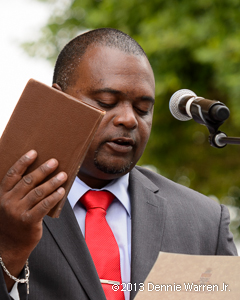
MLA blames mass status grants for gangs
 (CNS): Government backbencher Al Suckoo said the 2003 mass status grants to thousands of people is still causing problems in the community more than a decade later. Admitting he was a member of the UDP when it happened, Suckoo said that the failure to properly integrate the new Caymanians has created a divide in Cayman in which both sides suffer. He said there was animosity between the Jamaican and Caymanian cultures and it has encouraged gang development. The Bodden Town MLA said it was not the fault of those given status that there were so many social issues but because there was no effort made to assimilate so many new Caymanians, many of whom had not been in Cayman very long.
(CNS): Government backbencher Al Suckoo said the 2003 mass status grants to thousands of people is still causing problems in the community more than a decade later. Admitting he was a member of the UDP when it happened, Suckoo said that the failure to properly integrate the new Caymanians has created a divide in Cayman in which both sides suffer. He said there was animosity between the Jamaican and Caymanian cultures and it has encouraged gang development. The Bodden Town MLA said it was not the fault of those given status that there were so many social issues but because there was no effort made to assimilate so many new Caymanians, many of whom had not been in Cayman very long.
Speaking during the budget debate in the Legislative Assembly on Friday, Suckoo said that he was seeing the effects every day in his constituency and said that grants had created two societies that were not fully meshed. It was “a social experiment gone bad”, he said, as the local society was not prepared to deal with the creation of so many Caymanians and the population increase. He said that the gang development was a part of the failure to encourage integration but now there was even greater competition for jobs, especially at entry level, which had been compounded by the economic downturn.
Suckoo said that while working with the National Workforce Development Agency and trying to assist his constituents to find work he had discovered that although some Caymanians were not workplace ready and needed training, he had also seen discrimination against Caymanians by employers.
Cheap labour, he said, was a significant barrier to local people getting work, and while in the boom years people overlooked the workforce problems, the economic downturn required a new look as employers are not training people like they used to, creating a vicious circle.
“We now need to take a step back and re-look at how we deal with locals in the workforce and see if the policies are working and guaranteeing locals a part in future industries,” Suckoo urged, adding that the neglect of those Caymanians that cannot get work was showing up in the courts, the streets and homes.
He raised concerns about employers misrepresenting facts to get permits and urged immigration to be more vigilant as instances of abuse of the system fuelled the belief that government is not looking out for its people, just business. Aware too of employers in several cases telling Caymanian applicants that the adverts they are responding to are for work permit renewal and there is no vacancy, Suckoo reminded employers that was illegal.
Talking about the job drive which began last year when the immigration law was changed and work began on making the NWDA more effective, Suckoo said he had some success helping Caymanians get work but it was not all he had hoped for. Nevertheless, changes at the agency have vastly improved compared the situation before the work started. He said the task force which he chaired met numerous times between September and January and put forward several recommendations to re-engineer the NWDA, which have been implemented along the way. The full report is expected to be published shortly, he said.
Suckoo told the LA members that one of the most important positive changes was the interface between immigration and the agency so those approving permits can now see much more easily if there are Caymanians available for those jobs before they grant the permits. The MLA acknowledged, however, that there was still a skills gap and training was required to help the local unemployed to be workplace ready and align the needs of employers with the training.
During his contribution to the debate Suckoo also pointed to the pressing need for a minimum wage, as he said he wholeheartedly supported the implementation and was aware the labour minister was moving towards its introduction. The Bodden Town representative said he firmly believed that it would go some way to address the problem of cheap labour and competition for entry level jobs, opening up new opportunities for Caymanians. He said reasonable basic minimum pay would improve Cayman’s reputation and make it clear we don’t allow exploitation of foreign workers.